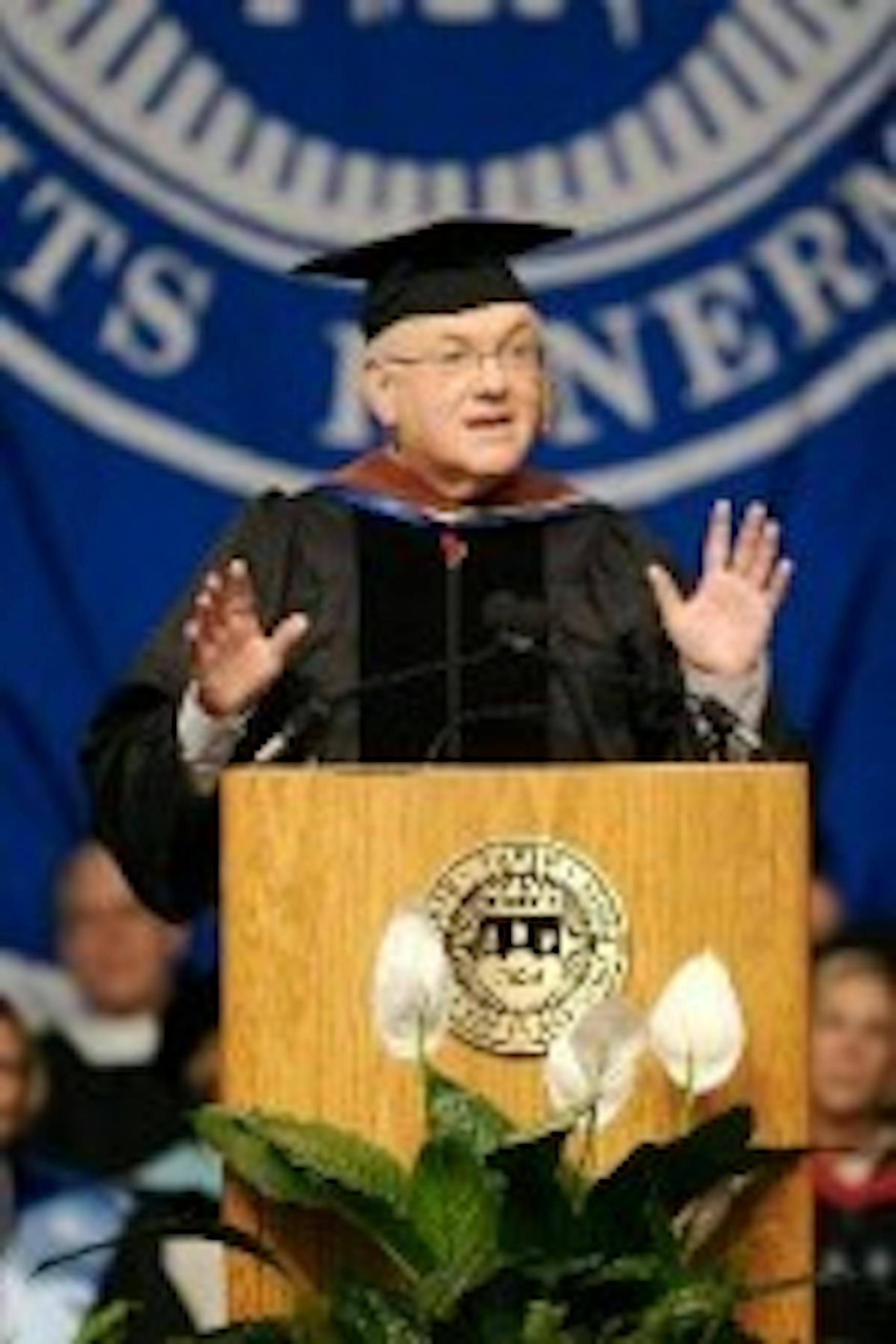Schneider urges awareness
CNN senior political analyst Bill Schneider '66 advised the graduating Class of 2008 to be politically aware and involved during his keynote address at the University's 57th commencement ceremony last Sunday. 826 undergraduates, 614 masters degree recipients, 84 Ph.D. candidates and their families packed into the Gosman Sports and Convocation Center. Schneider's words made many laugh, simultaneously sending a serious message to the graduates with a gentle yet guiding tone: Be mindful of changes in consciousness and unify our divided country.
Chair of the University Board of Trustees Malcolm Sherman introduced Schneider and four other recipients as they received their honorary degrees. Sherman referred to Schneider as the "Aristotle of American politics," citing an article in the Boston Globe.
Schneider is a contributing editor to National Journal magazine and The Atlantic Monthly and is a regular contributor to several prestigious publications. A winner of the Brandeis Alumni Achievement Award and former visiting professor in 2002 teaching on America's electorate, Schneider shared his political expertise with the graduates and their families.
"Sit down, shut up and listen to us," Schneider said, referring to members of his class and others like them who were involved in politics in their undergraduate years. He remembered that during his own graduation, several graduates turned their backs to the speaker, a United Nations ambassador, to show their opposition to the Vietnam War.
While this anecdote encouraged students to take an active role in politics, Schneider also admitted that his generation showed great enthusiasm for many issues, but at the same time, the country divided into irreconcilable political parties.
"Our generation has seen impossible things happen, and your generation will too," Schneider said. He continued, saying "our generation left this country divided." For 40 years now there has been a divide between red conservative and blue liberal America, he said.
"Americans have had enough," which is why the country has been nominating presidential candidates who will end the divide, said Schneider. He emphasized this point quoting Sen. John McCain, "This endless paralyzed anchor must end. We belong to different parties, not different countries." Schneider also noted Sen. Barack Obama's status as "the great unifier."
This year, Schneider said, voters are looking for the realization of President Bush's 2000 unfulfilled promise to be "a uniter, not a divider."
Schneider left the graduates with a charge to tend to the state of America: "We broke it, you fix it."
Schneider described his graduating class at Brandeis as the "cutting edge of the baby boom generation."
He quipped about his generation's great innovation, which was also colored with arrogance. "We Baby Boomers knew everything. We did everything. We invented sex. . We invented drugs ... and we darn sure invented rock and roll," he said, alluding to this generation's own change in consciousness and awareness. "Here's something else we invented: politics."
Schneider joked about President George W. Bush being part of his generation: "Oops, Our bad," he said. But he noted the changed nature of current politics: "Now look what we've got-a woman and an African American."
"Politics has become exciting again, just like it was for us in the 60s," Schneider said. "The audience for politics, bless their hearts, keeps growing and growing." He attributed part of that growth to the graduates and their peers "clicking and texting and blogging away."
Recalling his personal experiences growing up in the segregated South, Schneider discussed the indignation surrounding the enforcement of the Jim Crow laws and how Rosa Parks' courage brought the black community's outrage to public knowledge. "Consciousness changed," Schneider explained, tying his generation to the new concept of personal activism.
Schneider cited other changes in consciousness including Prof. Anita Hill's (Heller) testimony at U.S. Supreme Court Justice Clarence Thomas' Senate confirmation hearings in 1991, as a result of which,"sexual harassment changed overnight from a joke to a crime."
Continuing with his message about awareness, Schneider shared an anecdote about an Oxford graduate who asked the former British prime minister Benjamin Disraeli what he needed to know in order to enter public life. Disraeli replied that one must know oneself and one must know the times, Schneider recounted.
On a similar note, Sherman, in his speech, urged the graduates to remain opinionated and skeptical using their "Brandeis lens."
"Shout when you see that the emperor has no clothes," Sherman encouraged the graduates.
University President Jehuda Reinharz, who apologized for having to leave the ceremony early in order to attend his own daughter's graduation, also spoke about defying norms.
Reinharz gave a brief history of the creation of the University and said that "creating Brandeis was so out of the box." Five consultants advised the founders of the University against establishing Brandeis, he said. But building the institution, he said, was a grand and bold idea.
Reinharz advised the graduates to follow in the footsteps of their alma mater's founders by taking intellectual chances.
Reinharz presented honorary degrees to novelist and journalist James Carroll, Dr. Helene D. Gayle, president of the humanitarian organization CARE USA, past chairman of the Brandeis Board of Trustees Stephen Kay and mathematician and Prof. Karen K. Uhlenbeck '68.
Anya Bergman and Shana D. Lebowitz contributed reporting.



Please note All comments are eligible for publication in The Justice.